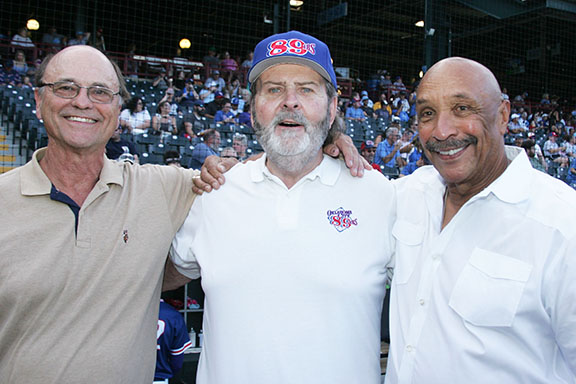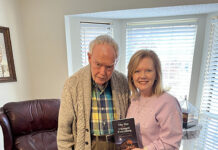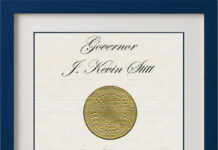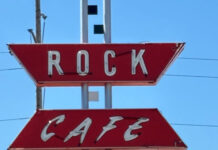
Story and Photos by Darl DeVault, contributing editor
Two former star players and an Oklahoma City Baseball 89er front office promotional legend were proudly introduced to the crowd on August 16th, as they were honored for their contributions to the team in their era.
Seniors who were raising children in the 1980s in OKC or attending 89ers games were well aware of the brilliance of Jim Weigel, 79, who made the ballpark a fun place beyond the play on the field. He and two others were inducted into the Oklahoma City Triple-A Baseball Hall of Fame. The Hall, established in 2023 to celebrate the 25th anniversary of Chickasaw Bricktown Ballpark, honors the most influential figures in Oklahoma City’s Triple-A baseball history.
New inductees, power hitter John Poff, star pitcher Scipio Spinks, and Weigel made significant contributions to the city’s baseball history during the 89ers era (1962-1997), a period marked by huge crowds and innovative promotions. The 89ers era, a time of significant growth and popularity for the team, with record-breaking attendance and a surge in fan engagement, holds a special place in our local sports history.
Weigel’s ingenious promotions, which he began with the San Diego Padres, were truly groundbreaking. His nine seasons there, serving as Director of Promotions and Marketing and later Director of Minor League and Scouting Operations, were marked by his ability to spark the San Diego Chicken and revolutionize fan engagement. Later, a grateful San Diego Chicken (now The Famous Chicken) put in appearances in OKC.
Weigel’s tenure as the 89ers Vice President and General Manager for 12 years (1981-1993) left an indelible mark on the OKC fans. His comprehensive strategy to build a fun and engaging atmosphere at the ballpark not only sparked nine of the top 11 yearly attendance records, including the single-season record in 1992, but also made the fans feel more connected to the game.
He enticed seven major league teams to play preseason exhibition games at the 89ers All Sports Stadium. His staff offered innovative fan experiences with nightly promotions, concerts, and the famous Dot Race. These unique elements of his strategy set the 89ers apart and created a sense of intrigue and engagement among the fans, making their experience truly memorable.
“My 1983 creation of Abner 89er dressed in throwback baseball attire, complete with his signature big mustache and pill box hat as a well-received mascot was innovative,” Weigel said. “I am proud fans can still purchase items with that logo 42 years later.”
In 1989, he designed the Robo Niner mascot, which stands as an early example of how technology, enhanced performance, and integrated branding became key components in revolutionizing the role of mascots in sports and entertainment. His efforts led to the dynamic and technologically advanced mascots we see today.
Weigel displayed a talent for developing promotional staff. He was adept at developing talent in sports administration, as many of his 60 former interns went on to successful careers. This proactive mentoring of an intern team sparked a prioritized fan engagement and marketing strategy throughout baseball.
Weigel emphasized entertainment beyond the game when he brought in renowned musical acts like The Beach Boys, The Temptations, Jimmy Buffett, and Chicago to perform postgame concerts. By extending beyond typical baseball-centric promotions, he tapped into a wider audience’s interest in live music. While concerts are now a common element in minor league promotions, his efforts in this area were inventive for the era.
This sustained success points to a well-executed and integrated strategy that resonated with the community, including his “Pack the Park” giveaways and sponsorship involvement. His 12 years of advanced original thinking, combined with creative entertainment, strategic partnerships, and a deep understanding of fan engagement, have never been equaled in OKC.
John Poff’s time as a power hitter with the Oklahoma City 89ers in 1978 and 1979 was not just a period of strong and consistent numbers. It was a time he later called “the real heart of my eight-season baseball career.” In his induction speech, he outlined the deep personal connection he felt with the city. This sentiment adds a layer of nostalgia and emotional connection that he is proud to share with the team and the city.
Scipio Spinks pitched for OKC for three seasons, leading the team in starts, innings, and strikeouts in 1969 and 1970. He holds two of the top nine single-season strikeout totals during the 89ers era and threw a no-hitter in 1969. Still humble today about his gratitude to Oklahoma fans, Spinks pointed out in an interview that he lost that no-hit game in the last inning without run support, but struck out 15 batters.














